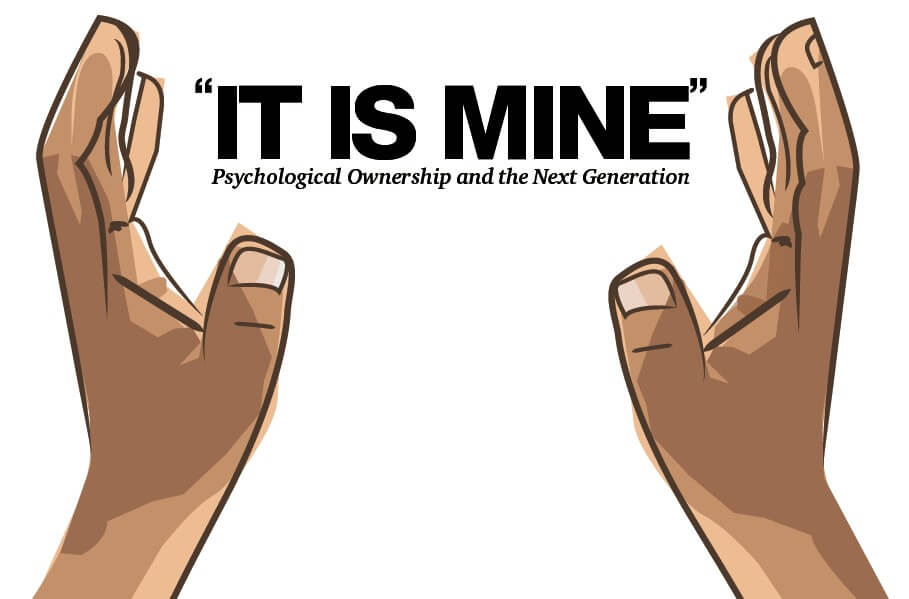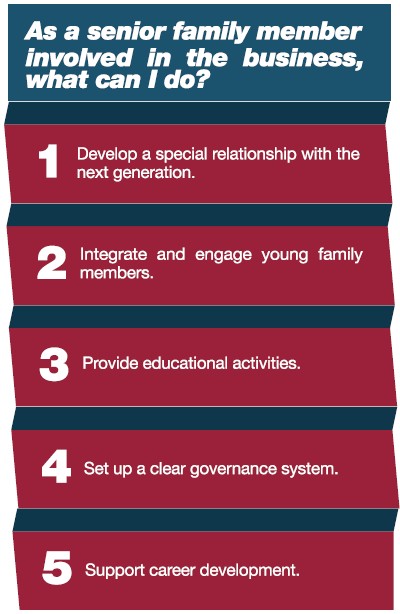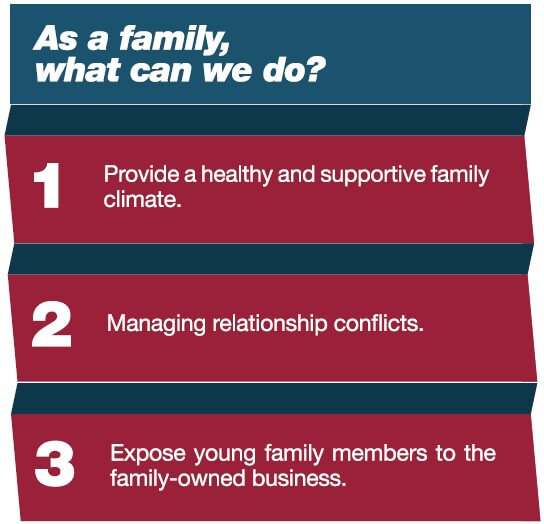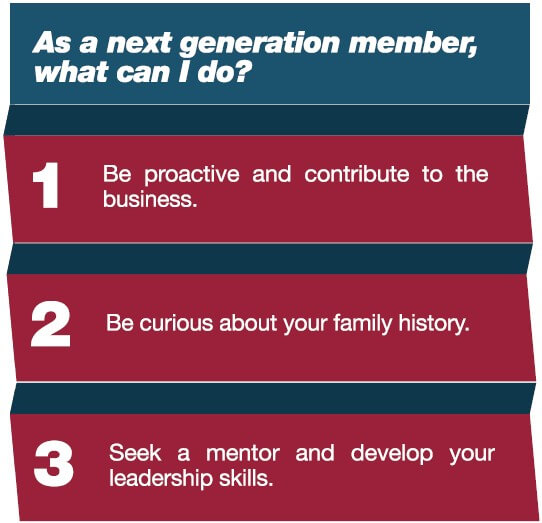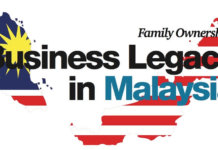From a very young age we experience feelings of ownership – “my bag”, “my brother”, “mine”. the words “mine” and “my” are commonly used to describe our relationship with objects, ranging from people, jobs, a family home, or an idea. this ownership-based vocabulary is applied when the object (material or immaterial in nature) becomes psychologically grounded. it is at this stage that the object is taken on as a possession. In this article, Lucia Ceja, Researcher, Chair of Family-Owned Business, IESE and Professor Josep Tàpies, Chair of Family-Owned Business, IESE, discuss their research on positive and negative psychological ownership in the family business and recommend ways to enhance the involvement of the next generation.
Feelings of ownership are commonly manifested in our daily lives and the resultant effects are more than clear. Protecting, nurturing, controlling and developing are behaviours usually associated with feelings of ownership.
The manifestation and consequences of psychological ownership are not limited to situations involving jobs, people or living quarters, they are also found in organisations. Studies related to psychological ownership indicate how the pattern is a reoccurring phenomenon as applied to the manner it affects the behaviour of individuals performing within organisations . In the family business context, the concept of psychological ownership captures the “fusion” between the next generation of family members and the business. Feelings of attachment and identification drive the sense of ownership. The foundation of the unique culture of family business and its inimitable competitive advantage is directly correlated to notions of ownership and the vigour that it inspires .
In our latest research study conducted at the IESE Family- Owned business chair, we explored the patterns of psychological ownership experienced by 20 next generation members of several family-owned firms of different sizes and generation stages. Using in-depth interviews, we aimed to understand the origin of psychological ownership in family-owned businesses, its consequences and how it is transmitted across generations.
From our empirical study, we found that the sense of psychological ownership grows naturally in next generation members under the appropriate conditions. Families in business can follow certain strategies to enhance this feeling of identification; our results show that next generation members generally experiencing strong levels of psychological ownership over the family business is due to a design reliant on a familial environment, which cultivates these feelings. Contrarily, a minority of next generation family business owners exhibit little or no psychological ownership towards their family business. Our findings suggest that the genesis of psychological ownership can be traced back to a specific family climate, which thrives on a special relationship between members of the elder generation (e.g. parents, grandparents) and their offspring. These dimensions appear crucial for fostering a sense of psychological ownership in next generation members.
Our study also discovered varying degrees of psychological ownership. The effects of experiencing psychological ownership can be experienced as positive (e.g. commitment, happiness), while in some cases the experience can become negative (e.g. lack of freedom). We propose the existence of two concepts: Positive Psychological Ownership (PPO) and Negative Psychological Ownership (NPO). These two manifestations have different consequences in the experience of next generation members. For instance, PPO appears to be associated with a sense of stewardship, commitment and responsibility towards the family business. Likewise, PPO seems to be linked to positive emotional and cognitive states such as enthusiasm, pride, passion, happiness and satisfaction. In contrast, NPO appears to be associated with a lack of interest in the family firm. This is linked to several negative cognitive and affective states such as pressure, frustration, obligation, debt and a lack of freedom.
Families in business should strive to develop PPO in their next generation members so they become committed and responsible owners. Building on the results of our study, we present some recommendations and best practices for the development of PPO .
If I’m a senior family member involved in the business, what can I do?
• Develop a special relationship with the next generation: You should seek to establish “mentoring and trusting relationships” with members of the next generation from an early age. This should help young family members to develop a healthy and strong psychological ownership towards the family business.
• Integration: Spend time together with the next generation through family meetings and visits to the business, which include explanations of family business practices. Such activities are likely to be very fruitful avenues for engaging next generation members in methods of the family business.
• Educational activities: Organise educational sessions, which highlight topics of interest with the express purpose of developing next generation members, for instance;
a) Individual and family skill development: Encourage the next generation to learn about their personality traits and personal strengths. Help them to find a sense of purpose in their roles and learn about the importance of family values. Train them in appreciative listening and communication, negotiation skills, managing conflict and understanding the family genogram.
b) Understanding and appreciating the business: Nourish their entrepreneurial spirit and financial know-how. Teach them about the corporate structure of the business, its strategic components and all other important aspects. Remember that the better knowledge next generation members have in relation to the family-owned business, the deeper the experience of psychological ownership towards the business project will go. In other words: “Nihil volitum nisi praecognitum.
• Governance: Start planning and developing governance mechanisms for organising the younger generations as soon as possible. Don’t wait until the next generation is already involved in the management of the business. It is important to remember that governance mechanisms do not have to be too elaborate or sophisticated to fulfil their purpose. Simple structures for meeting and decision-making will suffice and can make a positive difference in terms of the development of next generation owners, and present-day members affecting responsible decisions for the benefit of their family business.
• Support: Make the career development of next generation members a key priority for the business. For next generation members interested in working in the family business, the professional path along which they join the business seems to be determinant for developing Positive Psychological Ownership. Next generation members need rules, structure and support as they advance. Supporting young people’s career decisions and actively discussing options aimed at their professional development is an on-going process bent towards their individual success supporting the family business’ anticipated sustainability. Develop compensatory mechanisms (e.g. family council, junior committee) for integrating those next generation members that are not involved in the management of the business into roles that affect a graduated sense of involvement.
As a family, what can we do?
• A healthy and supportive family climate: Strive to become a flexible and adaptive family system that takes a positive and problem-solving approach to conflicts and difficulties, maintains clear boundaries regarding what is and what is not within the family’s domain of action, has a clear model of family leadership, and maintains the business as a positive and essential component of the family identity.
• Managing relationship conflicts: Remember that conflict does not destroy a relationship if it is handled and counterbalanced by positive emotions such as trust, affection, humour, positive problem-solving and empathy. Active and appreciative listening can help your family systemically manage conflicts successfully. Effective conflict management necessitates open disagreement with good communication skills. The building of good communication will empower your family to fight for their relationships and for the business project.
• Exposure to the family-owned business: Don’t exclude young members from the more informal family conversations regarding the business; ask them instead to play an active role in such conversations. Young members need to feel that the family-owned business is an important part of their identity and therefore, they must be encouraged to nurture and develop their role in the family business’ projects.
If I’m a member of the next generation, what can I do?
• Be proactive: Seek an active role in the family business by pursuing information, asking questions regarding the family business history, its vision, mission, and values. You should strive to find your own way to contribute to the family business flourishing.
• Be curious: Become curious about your family history, how the family business was founded and which members have been key players in the development of the business.
What were their dreams? How did their personal history come to affect their business decisions? Engaging in an exercise centred on developing a family genogram through the collection of pictures and an oral history of the family business by talking to different family members and ascertaining their roles in the family business can be a pricelessly inspiring activity that may help family members connect further.
• Seek a mentor: Look for a mentor (a family or a non- family member) with the aim of developing your leadership skills and know-how of the family business further. You may also seek a different form of professional advice from a family psychologist or professional coach, who can help you identify your personal strengths and resources and overcome your weaknesses. With the advice of an expert you can learn a series of soft-skills that can be of great help while you become increasingly more involved in the family-owned business.
This article explores a very real and very common aspect of family business life: Next generation members’ psychological ownership of their family business. The feeling of ownership has the power to stir in the next generation a sense of stewardship, commitment, responsibility, and passion towards the business project. However, if ownership feelings are not steered and carefully overseen, they can also promote the disengagement of the next generation. It is paramount that families in business appreciate and understand the important and powerful role that psychological ownership plays in the flourishing of their business projects over generations.
1. Kurt, T., Dirks, Larry L., Cummings, and Jon L. Pierce (1996). Psychological ownership in Organizations: Conditions under which individuals promote and resist change.
2. Pierce, J.L., Kostova, T., & Dirks, J.L. (2001).Toward a theory of psychological ownership in organizations.
3. Björnberg, Ä, & Nicholson, N. (2012). Emotional Ownership: The Next Generation’s Relationship with the Family Firm.
4. Ceja, L., & Tàpies, J. (2011). A model of psychological ownership in next-generation members of family owned firms: A qualitative study.
5. Based on: Tàpies, J., & Ceja, L. (forthcoming book chapter). Psychological ownership: The golden thread between the next generation and the family-owned business.
Tharawat Magazine, Issue 16, 2012


